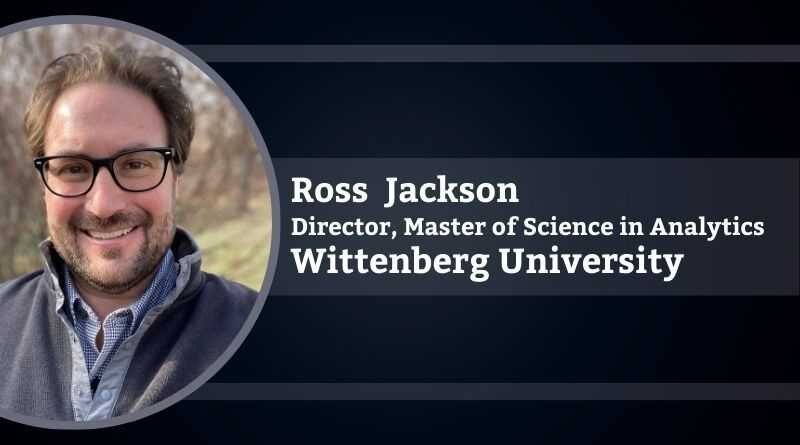Commonplace Banality: Implications of Chatbots for Education, Management, & Humanity
By Ross Jackson, Director, Master of Science in Analytics, Wittenberg University
Science fiction is filled with stories of technology subjugating humanity. HAL in 2001: A Space Odyssey, or more comedically, AUTO in WALL-E, are culturally established examples of this genre. Often these stories convey a sense of danger and loss associated with technological advancements beyond our comprehension or control. Technology, at the cusp of adoption, is often feared until it is accepted as a tool. Previous iterations suggest that radical technological transformations quickly become commonplace banalities. The release of ChatGPT (Chat Generative Pre-trained Transformer) by OpenAI in November 2022 has provoked the expected concerns as to what chatbot technology portends for education, business, and humanity. Whereas chatbots of this type are currently novel, there are analogs available to inform our thinking as to their likely consequence.
History can be viewed as the study of the human consequences of technological advancement. Technology shapes and constrains human effort, understanding, and capability. Each inflection point requires some form of social recalibration. Some technological advancements are evolutionary, some are revolutionary. Each, in its way, upends established ways of being and doing. These human adjustments are observable in both education and employment. Learning and doing mathematical operations changed in response to the calculator and subsequently personal computers. Writing papers changed first with spellcheck and then with the ability to check grammar. At the time, those involved in education were concerned about what the new technology meant for established ways of learning and demonstrating knowledge. Chatbots are currently extending this long-established concern as entire responses can now be formulated using artificial intelligence. Students will explore each new tool, as resources will allow, finding ways to reduce their workload and increase the likelihood of obtaining a better grade. Educators will be concerned with how to identify unauthorized usage, and how to integrate new tools into student learning effectively. The current advancement in chatbot technology in education is novel in terms of its specific applications but conforms to the structure of integration that has played out many times.
History shows that emergent technologies produce both excitement and dread before settling into commonplace banality. The human capacity for creativity, critique, and the forming of meaning transcends technology.
What is learned in school often becomes common practice as one advances through life, work, and organizational management. In many ways, the concerns of new technology in organizational management converse with education. Defining what constitutes work, and how it can be executed more efficiently is a central managerial concern. Organizations operating under the pressures of free market capitalism are enticed to find increasingly efficient ways of performing tasks. Often attention is focused on deskilling work to the maximum extent possible. As such, once proven, technology tends to be incorporated relatively quickly within organizations to shift power and pay further away from workers and those with authority. There is no need to hire a person proficient in math, only somebody who can operate a calculator; no need to hire a person with spelling and grammar skills; the computer automatically corrects those types of errors. If drafts can be produced more efficiently through chatbots, market dynamics will force their eventual implementation within organizations. In either education or management, the question isn’t if this new chatbot technology will be adopted, but rather when, how, and if it will be done so ethically.
As with most technological advancements, the question becomes what constitutes its ethical implementation. In terms of chatbots in education and management, more is needed to say with certainty. However, there are other elements associated with its implementation which seem reasonable to expect. Individuals, students, or workers will likely become acquainted with the technology before educators or managers. Individual advantage incentivizes a quicker response than can be mustered by institutions. Organizations, educational and professional, will eventually accommodate inclusion of the technology. Due to market pressures professional organizations will likely adopt the technology quicker than educational institutions. When they do adopt the technology, it will likely fall short of either the fears or desires. It might feel (but not look) unremarkably like today. These dynamics play out repeatedly. The development of a robust chatbot tool incentivizes the development of a chatbot identification tool. This has already occurred. Technology can increase the speed and accuracy of rudimentary tasks, like computational mathematics, spelling and grammar, and now fully drafted responses. Technology has yet to replicate the creativity of humans or its capacity to critique. Such a situation eventually brings us to the human element of technology.
Technology has yet to preclude the development of desired and lucrative skills. Educators and professionals are concerned with the development and execution of these capabilities. In the margins permitted by these institutions, humans pursue those things that allow for their authentic and autonomous expression. Works of science fiction reflect our collective fear of technology not yet understood. History shows that emergent technologies produce both excitement and dread before settling into commonplace banality. The human capacity for creativity, critique, and the forming of meaning transcends technology. These human capacities are the basis for the development of technology itself. Chatbots are coming, and with them will come implications for education, management, and humanity. Things will be lost with its implementation. For those committed to those things, this technological advancement is a tragedy. Most will simply adapt and integrate technology into their life. The days of humans creating initial drafts of school papers and business reports could be limited. These might be replaced with a heightened focus on the value associated with human editing of chatbot-generated content. Such a role still requires the human capacities of creativity and critique. Regardless of the technological advancement, humans devise ways to rediscover and reassert their humanity.
Biography:
Ross Jackson is an assistant professor of management and the program director of the master of science in analytics program at Wittenberg University in Springfield, Ohio. He is the author of the book, Management in Quandary: A Critique of Organizational Power.

